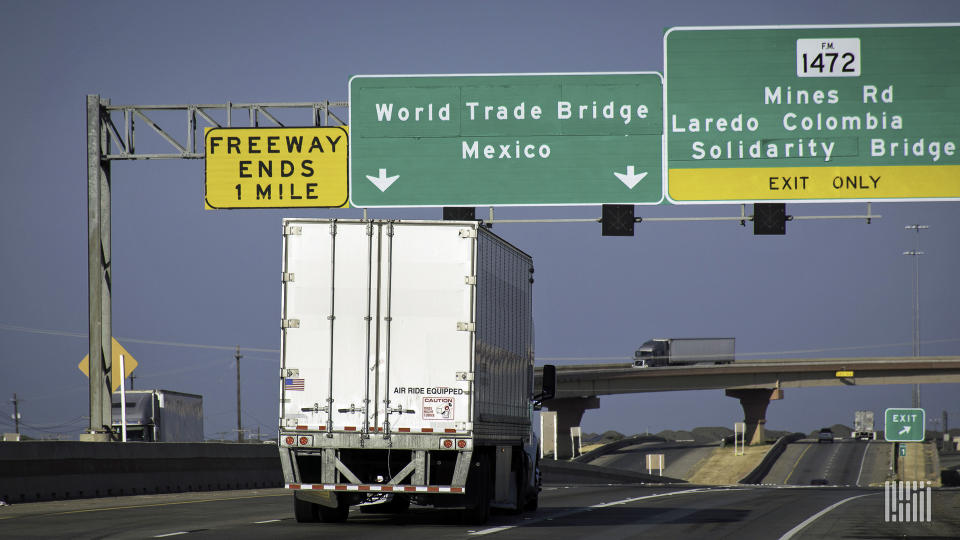B-1 drivers offer unique value proposition for cross-border carriers

Freight movements between the U.S. and Mexico continue to grow, and ongoing nearshoring efforts show no signs of slowing. As more goods move across the border, conversations between carriers and insurance providers regarding B-1 truck drivers from Mexico are happening more frequently.
While B-1 truck drivers from Mexico are able to enter the U.S. to complete deliveries, cabotage laws greatly restrict their movements and activities within the country.
When moving freight between Mexico and the U.S., these drivers are permitted to pick up a load in Mexico and drop it off in the U.S. They are then allowed to pick up another load in the U.S., but that shipment must be dropped off back in Mexico. All movements must be part of an international stream of commerce.
“There are only a handful of providers that will offer auto liability and other lines of coverage to fleets with B-1 drivers for a variety of factors stemming from the difference in Mexican versus American standards — paramount of which include cabotage law, cargo insurance standards, differences in federal driver performance tracking, licensing and language proficiency,” said Mark Vickers, executive vice president and head of international logistics at Reliance Partners. “However, we have many of our standard insurance providers, insurtechs and captives starting to play ball with us for the first time, and this timing is perfect.”
Insurance companies also shy away from B-1 drivers because of the differences in driver performance tracking between the U.S. and Mexico.
All U.S. drivers have motor vehicle records (MVRs) managed by the Federal Motor Carrier Safety Administration. These files play a large role in assessing driver safety and determining carrier insurability. Mexican drivers do not have MVRs. Instead, they have PSP files. While these documents do provide some insight into a driver’s track record, they are not as detailed or complete as MVRs, creating hesitancy among insurance markets.
“Historically, U.S. markets have stayed away from B-1 drivers, as driving performance is one of the main rating factors when quoting for most companies,” according to Reliance Partners Account Executive Stephanie Alegria. “Unfortunately, with these license types, there are no driving/violation records that can be used to help determine the quality of the driver pool.”
Despite this relative lack of performance documentation, B-1 drivers bring a unique value proposition to the table, including lower hiring costs and an eagerness to find — and retain — driving jobs.
Vickers noted that truck driving is a highly desirable job in Mexico because it tends to pay significantly more than any comparable positions within the country. This creates a high level of competitiveness and excellence in the Mexican driver pool.
While it is difficult for B-1 drivers to provide evidence of their previous driving behaviors via government documentation, Alegria noted that most of these drivers have proved even safer than their U.S. counterparts in practice. This is likely because the process of becoming a truck driver is much more stringent in Mexico.
“The extensive process to become a B-1 driver creates drivers that tend to be more cautious and more involved in operations, leading to fewer accidents and violations. In turn, this creates a safety culture that most markets really appreciate and reward in the form of more favorable premiums,” Alegria said.
The performance-based hesitancy surrounding B-1 drivers is starting to ease up. Alegria attributes this shift to the increase of technology-driven carriers, as companies are now able to monitor driver performance through ELD data sharing on almost a real-time basis.
This ability to monitor drivers as they go, combined with how well the cross-border market carriers have performed from a loss ratio perspective, has prompted more insurance providers to begin accepting carriers with a portion of B-1 drivers.
Reliance Partners sees embracing B-1 drivers as a positive step toward a safer and more efficient transportation industry, and the company has committed to helping its peers in the insurance space better understand the value these drivers bring to the table.
“As Reliance, we have made an effort to put a spotlight on these types of drivers and the risks associated with them,” Alegria said. “We have made a significant move to get markets in conversations about these drivers, in the hopes of creating more options for these types of operations.”
Industrywide change takes time, but Alegria and Vickers agree that opportunities for B-1 drivers will likely expand significantly as both the transportation and insurance industries continue to become more globally focused and technologically advanced.
Click here to learn more about Reliance Partners.
Reliance Partners’ 7th Annual Modernization of Cross-Border Trade Event will be held in Laredo, Texas, on Aug. 6. For more information on the event and where to sign up, visit here.
The post B-1 drivers offer unique value proposition for cross-border carriers appeared first on FreightWaves.


